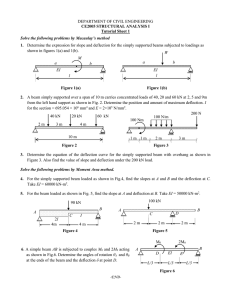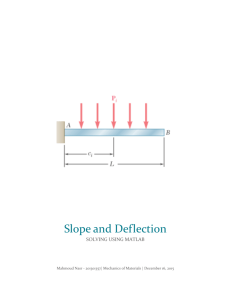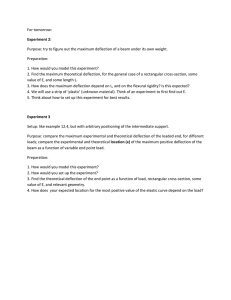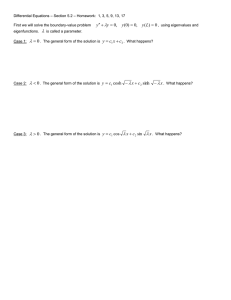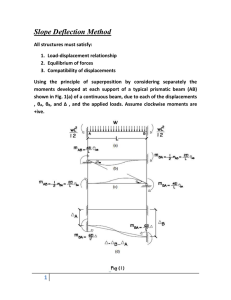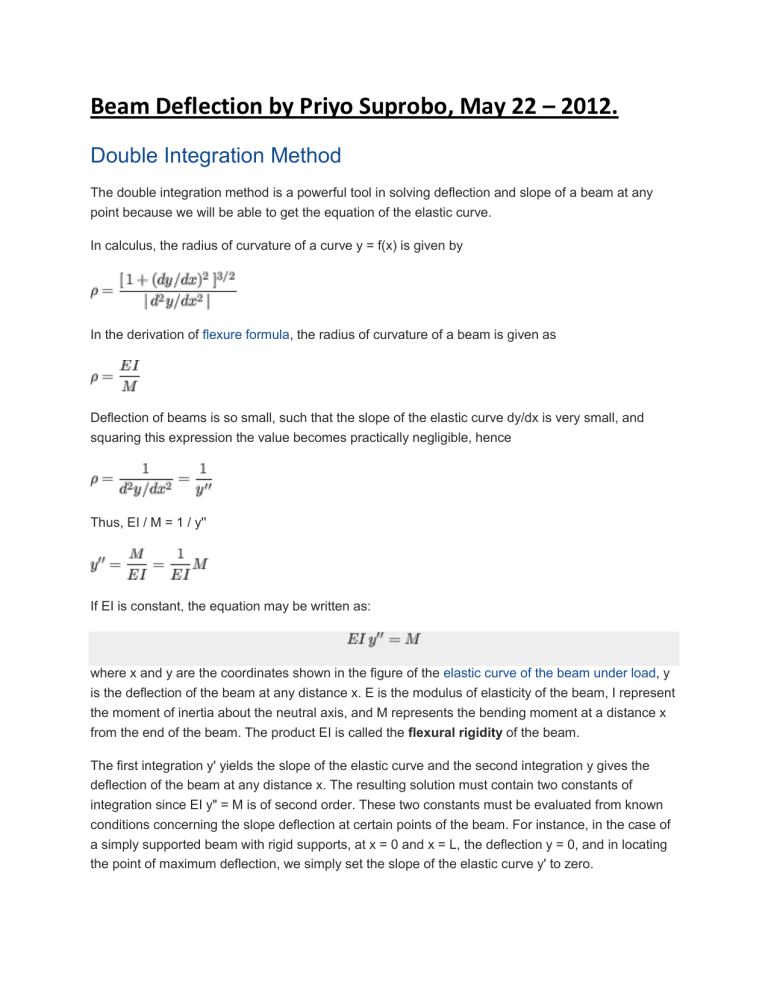
Beam Deflection by Priyo Suprobo, May 22 – 2012. Double Integration Method The double integration method is a powerful tool in solving deflection and slope of a beam at any point because we will be able to get the equation of the elastic curve. In calculus, the radius of curvature of a curve y = f(x) is given by In the derivation of flexure formula, the radius of curvature of a beam is given as Deflection of beams is so small, such that the slope of the elastic curve dy/dx is very small, and squaring this expression the value becomes practically negligible, hence Thus, EI / M = 1 / y'' If EI is constant, the equation may be written as: where x and y are the coordinates shown in the figure of the elastic curve of the beam under load, y is the deflection of the beam at any distance x. E is the modulus of elasticity of the beam, I represent the moment of inertia about the neutral axis, and M represents the bending moment at a distance x from the end of the beam. The product EI is called the flexural rigidity of the beam. The first integration y' yields the slope of the elastic curve and the second integration y gives the deflection of the beam at any distance x. The resulting solution must contain two constants of integration since EI y" = M is of second order. These two constants must be evaluated from known conditions concerning the slope deflection at certain points of the beam. For instance, in the case of a simply supported beam with rigid supports, at x = 0 and x = L, the deflection y = 0, and in locating the point of maximum deflection, we simply set the slope of the elastic curve y' to zero. Problem 605 Determine the maximum deflection δ in a simply supported beam of length L carrying a concentrated load P at midspan. Solution 605 At x = 0, y = 0, therefore, C2 = 0 At x = L, y = 0 Thus, Maximum deflection will occur at x = ½ L (midspan) The negative sign indicates that the deflection is below the undeformed neutral axis. Therefore, answer Problem 605 Determine the maximum deflection δ in a simply supported beam of length L carrying a concentrated load P at midspan. Solution 605 At x = 0, y = 0, therefore, C2 = 0 At x = L, y = 0 Thus, Maximum deflection will occur at x = ½ L (midspan) The negative sign indicates that the deflection is below the undeformed neutral axis. Therefore, answer Problem 606 Determine the maximum deflection δ in a simply supported beam of length L carrying a uniformly distributed load of intensity wo applied over its entire length. Solution 606 From the figure below At x = 0, y = 0, therefore C2 = 0 At x = L, y = 0 Therefore, Maximum deflection will occur at x = ½ L (midspan) Problem 607 Determine the maximum value of EIy for the cantilever beam loaded as shown in Fig. P-607. Take the origin at the wall. Solution 607 At x = 0, y' = 0, therefore C1 = 0 At x = 0, y = 0, therefore C2 = 0 Therefore, The maximum value of EI y is at x = L (free end) answer answer Taking W = woL: answer Problem 610 The simply supported beam shown in Fig. P-610 carries a uniform load of intensity wo symmetrically distributed over part of its length. Determine the maximum deflection δ and check your result by letting a = 0 and comparing with the answer to Problem 606. Solution 610 By symmetry At x = 0, y = 0, therefore C2 = 0 At x = a + b, y' = 0 Therefore, Maximum deflection will occur at x = a + b (midspan) Therefore, answer Checking: When a = 0, 2b = L, thus b = ½ L (ok!) Problem 616 For the beam loaded as shown in Fig. P-616, determine (a) the deflection and slope under the load P and (b) the maximum deflection between the supports. Solution 616 At x = 0, y = 0, therefore C2 = 0 At x = a, y = 0 0 = -[ b / (6a) ] Pa3 + aC1 C1 = (ab/6)P Therefore, Part (a): Slope and deflection under the load P Slope under the load P: (note x = a + b = L) answer Deflection under the load P: (note x = a + b = L) answer Part (b): Maximum deflection between the supports The maximum deflection between the supports will occur at the point where y' = 0. At y' = 0, ⟨ x - a ⟩ do not exist thus, At , answer Problem 617 Replace the load P in Prob. 616 by a clockwise couple M applied at the right end and determine the slope and deflection at the right end. Solution 617 At x = 0, y = 0, therefore C2 = 0 At x = a, y = 0 0 = -(M / 6a)(a3) + aC1 C1 = Ma / 6 Therefore, Slope at x = a + b answer Deflection at x = a + b answer Problem 618 A simply supported beam carries a couple M applied as shown in Fig. P-618. Determine the equation of the elastic curve and the deflection at the point of application of the couple. Then letting a = L and a = 0, compare your solution of the elastic curve with cases 11 and 12 in the Summary of Beam Loadings. Solution 618 At x = 0, y = 0, therefore C2 = 0 At x = L, y = 0 Therefore, answer At x = a answer When a = 0 (moment load is at the left support): answer When a = L (moment load is at the right support): answer
